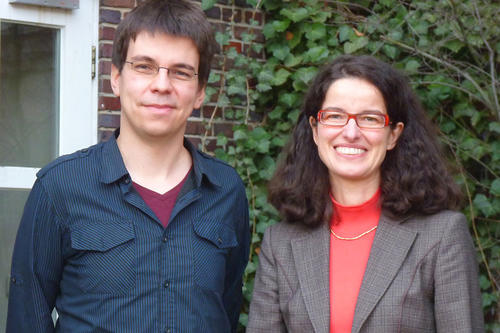Well Selected and Properly Dosed
Pharmacists and mathematicians in the PharMetrX doctoral program have been working on individual recommendations for administering drugs for five years now.
Jan 27, 2014
What medication has what effects on whom, and how? Researchers and doctoral candidates at Freie Universität Berlin and the University of Potsdam have been investigating these questions for five years as part of the PharMetrX program.
Image Credit: Andreas Franke / Fotolia.com
Professor Charlotte Kloft and André Schäftlein, who graduated from the PharMetrX program, do research on individualized medications.
Image Credit: Bianca Schröder
Two patients suffer from infections in the chest area following a bypass operation, and the doctor prescribes the same medication for both. It works for one, but not the other. Could this have been foreseen? Pharmacists and mathematicians at Freie Universität Berlin and the University of Potsdam are working together on drug recommendations that are better tailored to individual patients or groups of patients.
As part of the “PharMetrX: Pharmacometrics & Computational Disease Modeling” doctoral program, they are developing mathematical models of the progress of a disease, taking account of factors such as age, sex, and individual metabolism. The program will celebrate five years of existence this year; its first few graduates are now successfully working in academic and industrial research.
Prolonged suffering and a higher bill: When medications are chosen poorly or dosed incorrectly, the consequences affect both the patient and the healthcare system. With this in mind, the regulatory agencies responsible for approving new medications require the results of modeling studies for most newly developed drugs, with the progress of the disease and effects of medication being simulated and predicted by computer.
“We are experiencing a paradigm shift right now. There is a greater focus on analyzing which groups of patients benefit from a medication,” explains Charlotte Kloft, a professor and the head of the Clinical Pharmacy and Biochemistry division at the Institute of Pharmacy at Freie Universität. “Our goal is to achieve a fundamental understanding of the basic mechanisms underlying the interaction between a medication and the patient, and to visualize them via complex mathematical models. In the future, this is sure to lead to package inserts increasingly containing different sets of recommendations,” she says. The structured doctoral program is jointly chaired by Kloft, of Freie Universität, and mathematics professor Wilhelm Huisinga, of the University of Potsdam.
Strong Partnerships
The PharMetrX program represents a unique opportunity to gain further academic qualifications in the exciting field of pharmacometrics, says graduate André Schäftlein. One particular strength of the program lies in its partnerships with the pharmaceuticals industry: Six well-known pharmaceutical manufacturers support the program as cooperation partners. Each doctoral candidate is paired with a mentor from one of the cooperation partners. “I gained a great deal of useful insight at my drug company, Abbot, now AbbVie, and kept in close touch with my mentor,” Schäftlein says.
The pharmaceutical researcher also found working with his fellow students from the departments of mathematics and bioinformatics to be a rewarding experience. “At the outset, it wasn’t all that easy to communicate with each other, since we used certain terms completely differently. But our different training meant that we benefited a great deal from each other,” he says. Schäftlein wrote his dissertation on the more rational use of anti-infective drugs in patients who are at elevated risk of infection due to an underlying disease such as cystic fibrosis or diabetes. Since April, he has been doing research as a postdoc at Saarland University.
Interdisciplinary Work
For Schäftlein’s fellow student Valerie Nock, by contrast, it was clear that she wanted to work for a pharmaceutical company after finishing her studies of pharmacy and earning her doctorate. She felt she was well prepared to start her career at Boehringer Ingelheim – thanks to the subject-specific knowledge she had gained through the PharMetrX program and to an internship at Sanofi as part of the module curriculum developed for PharMetrX.
Her experience with interdisciplinary work in the doctoral program also turned out to be extremely useful. Nock says, “I now work as part of a team with colleagues from the fields of pharmacometrics, medicine, statistics, and sometimes even marketing and market access. Finding a common language is a big challenge.” Because pharmacometrics is still a relatively new discipline, Nock finds herself explaining time and again how she hopes to use mathematical models to improve the use of medications.
A Doctoral Program with Bright Career Prospects
In the management levels at pharmaceutical companies, the word has already gotten out about the quality of this program to support junior scholars and researchers and the importance of research in pharmacometrics. The participating companies have provided about 1.6 million euros in funding for the PharMetrX doctoral program to date. Four to eight doctoral candidates are admitted to the program each year. In the future, program co-chairs Charlotte Kloft and Wilhelm Huisinga plan to draw up an individually tailored development plan for each candidate and link the program with international initiatives aimed at supporting junior scholars and scientists.
Further Information
Prof. Dr. Charlotte Kloft, Freie Universität Berlin, Department of Biology, Chemistry, Pharmacy, Institute of Pharmacy, Tel.: +49 30 838 50676, Email: charlotte.kloft@fu-berlin.de


